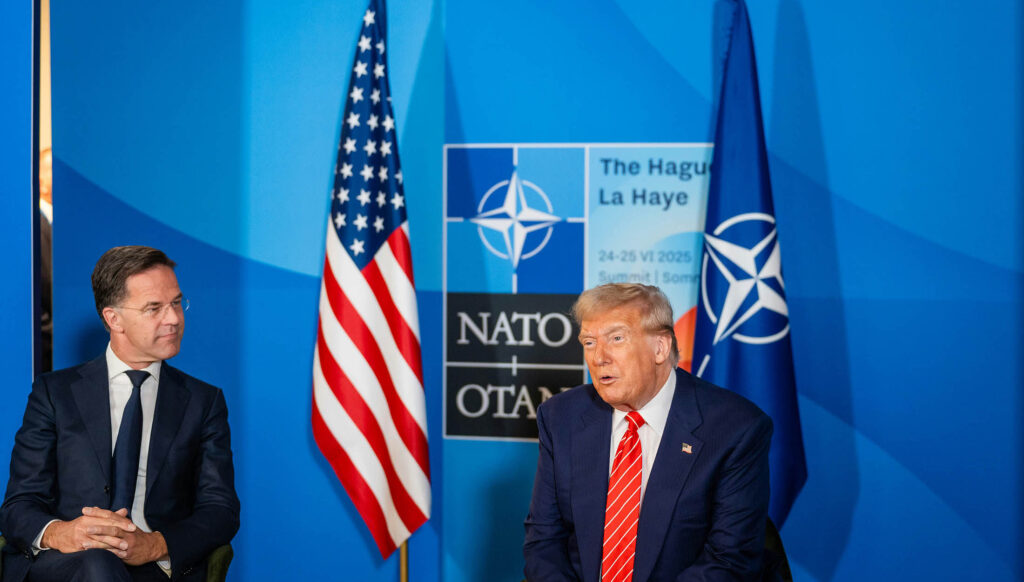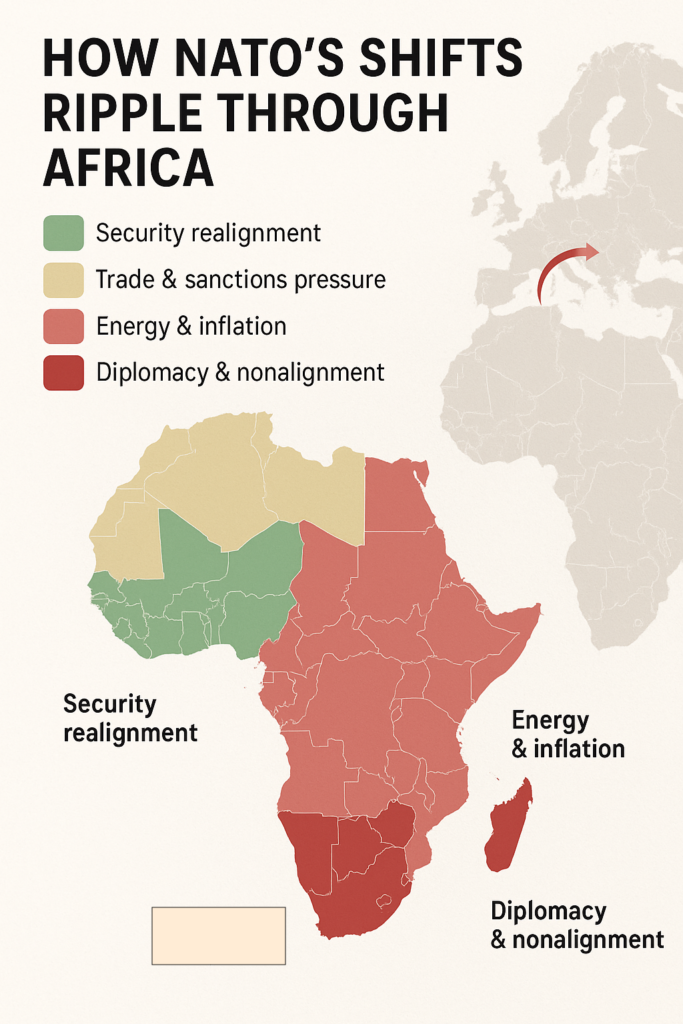
Photo: Courtesy Official NATO photo/Martijn Beekman
By AFRICA BAZAAR Staff Writer | October 22, 2025
WASHINGTON, D.C. — NATO Secretary General Mark Rutte arrived in Washington late Tuesday for a last-minute two-day visit to meet with President Donald Trump, in what diplomats described as an urgent mission to steady transatlantic unity after a week of mixed signals from the White House on Ukraine — and growing unease across global capitals, including in Africa.
The brief statement from NATO headquarters in Brussels offered few details. But people familiar with the trip said Rutte, the former Dutch prime minister who took over the alliance a year ago, came to clarify U.S. intentions following Trump’s sudden shift toward Moscow’s position and his proposal that Ukraine cede territory to Russia in exchange for peace.
“This is about clarity and credibility,” said one senior European diplomat. “NATO needs to know where Washington stands — and where it’s heading.”
Trump’s Shifting Stance
The visit follows a volatile stretch in Washington’s foreign policy orbit.
After a two-hour call with Russian President Vladimir Putin last week, Trump announced plans for a summit in Budapest to “negotiate an end to the war.” The plan quickly collapsed after a tense call between Secretary of State Marco Rubio and Russian Foreign Minister Sergey Lavrov, when Moscow made clear it had no intention of altering its territorial demands.
During his meeting with Ukrainian President Volodymyr Zelenskyy last Friday, President Trump dismissed requests for long-range Tomahawk missiles. Hours later, in a social media post, he urged Ukraine to “negotiate peace now” by giving up parts of its eastern territory.
For European leaders, Rutte’s trip is part of a broader NATO effort to keep Trump aligned with the alliance’s strategy as frustration mounts over mixed messages.
“President Trump has always said he wants peace,” Rutte told reporters earlier this month. “The challenge is ensuring that peace does not come at the expense of Ukraine’s sovereignty.”
Fresh Fighting in Ukraine
Even as diplomacy unfolded, the war on the ground intensified. On Tuesday, Ukrainian forces struck a Russian chemical plant in Bryansk, a key supplier of explosives and rocket-fuel components. Moscow retaliated early Wednesday morning with three waves of missile strikes on Kyiv and nearby Brovary, igniting fires and leaving parts of the capital without power.
The escalation underscored the stakes for Rutte’s Washington visit — and the fragility of Western cohesion.
A Meeting With Broader Stakes: The Africa Equation

Trump and Rutte are set to meet Wednesday afternoon at the White House.
According to officials, the talks will center on putting pressure on Russia through sanctions, ensuring that European allies meet defense-spending pledges, and accelerating delivery of air-defense systems and ammunition to Ukraine — priorities reaffirmed at this summer’s NATO Summit in The Hague.
The two are also expected to discuss next month’s NATO-Industry Forum in Brussels, themed “Rearming NATO—Innovate, Accelerate, Sustain.” The forum aims to channel a surge in defense spending into new industrial capabilities — an effort Rutte has described as “rearming, but also innovating.”
This will be Rutte’s fourth bilateral meeting with Trump since March, highlighting the urgency and complexity of managing the U.S.–European relationship and the Russia-Ukraine war. Trump’s unpredictable diplomacy has left allies balancing reassurance with restraint — praising his calls for burden-sharing while worrying about his overtures to Putin.
“If America wavers,” said a former U.S. defense official who spoke on condition of anonymity, “the entire alliance feels it.”
While the diplomatic drama plays out in European corridors, its reverberations are already being felt much farther south.
The African continent, long a quiet theater in the great-power contest, is now a critical observer — and, in some respects, a potential casualty — of the shifting Western order.
Security experts say a divided NATO could embolden Russia’s expanding footprint across the continent. For example, Russian-linked mercenaries and defense deals have surged in recent years in the Sahel, Libya, and the Central African Republic, filling vacuums left by retreating Western forces.
“If NATO pulls back on deterrence, Moscow doubles down in Africa,” said a former U.S. Africa Command adviser.
RELATED READING:
Countries reliant on Western security aid could face sharper choices — between Moscow’s guns and Washington’s promises.
Experts warn that another potential area where African nations will feel the impact is trade and sanctions: A thaw in U.S.-Russia tensions could alter Africa’s trade calculus. Lifting or easing sanctions might reopen markets for Russian fuel, fertilizers, and grain — lifelines for countries like Egypt, Kenya, and Nigeria.
But Western companies, wary of shifting priorities and reduced aid budgets, could slow new investment in African infrastructure and technology. Analysts warn that could test the resilience of the African Continental Free Trade Area, still dependent on predictable Western financing.
The Ukraine conflict has already upended Africa’s food and fuel supplies. Any settlement favoring Russian exports without restoring Ukrainian production could prolong Africa’s inflation crisis — especially for import-dependent economies, experts warn.
For governments already stretched thin, that may mean higher subsidies, weaker currencies, and rising discontent. Many African governments, including major economies like Kenya, Nigeria, South Africa have already adopted a pragmatic neutrality — engaging both Moscow and Washington.
Nevertheless, the neutral stance has not changed the U.S. and other Western partners from viewing Africa’s growing alignment with Russia through platforms like BRICS and the G20 as both a security and economic strategic challenge, which places African nations in a difficult geopolitical balancing act as NATO recalibrates its global role.
While membership in these blocs offers access to new trade, energy and investment opportunities —particularly from Beijing and Moscow—it also risks straining relations with Western partners. Countries such as Egypt, Ethiopia, and South Africa, active voices within the expanded BRICS and the G20 find themselves in a difficult geopolitical balancing act amid increased pressure from the West to clarify their positions on global conflicts like Ukraine.
On one hand, the dual allegiances leave government leaders walking a diplomatic tightrope, seeking to benefit from multipolar partnerships without alienating traditional Western allies or jeopardizing vital development aid and security cooperation.
On the other hand, “a fragmented global order creates opportunity for African cohesion to strengthen collective defense and trade coordination,” said an African economic expert. “We can’t rely on Washington, Brussels, or Beijing to decide Africa’s future.”
From energy prices to defense contracts, the outcomes of this week’s White House meeting will echo far beyond Brussels.
“The next NATO chapter won’t be written in Europe alone,” said an Addis Ababa-based diplomat. “It will also be felt in Accra, Nairobi, and Abuja.”




